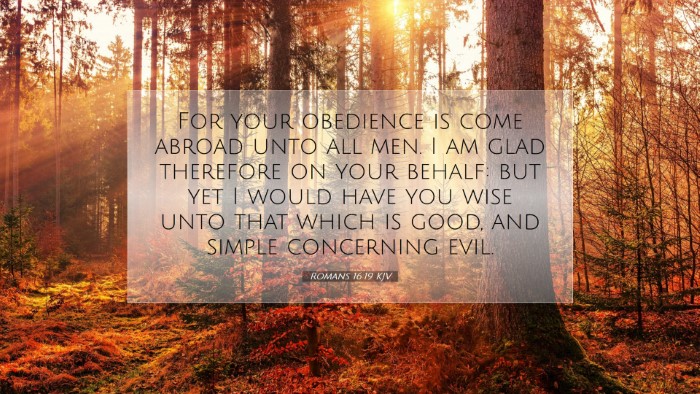Commentary on Romans 16:19
Introduction
Romans 16:19 stands as a pivotal verse within the concluding chapter of Paul’s epistle to the Romans. The verse reads:
"For your obedience is come abroad unto all men. I am glad therefore on your behalf: but yet I would have you wise unto that which is good, and simple concerning evil." (Romans 16:19, KJV)
This verse highlights a significant aspect of Christian life—obedience to God and discernment between good and evil. The insights extracted from public domain commentaries provide a rich examination of Paul’s message in this verse.
Exegesis of Romans 16:19
1. Obedience and its Public Recognition
Paul begins by acknowledging the reputation of the Roman believers for their obedience, which has become known throughout the early Christian world. Matthew Henry notes that their faithfulness had been a topic of conversation among other believers, serving as an example for many. It signifies that their actions were not unnoticed and speaks to the collective witness of the church.
2. The Joy of the Apostle
Paul expresses joy over the obedience of the Romans, illustrating a pastoral heart that desires the spiritual well-being of the church. Adam Clarke comments on the importance of community recognition in the growth and encouragement of believers. The joy Paul experiences is not merely personal but extends to the health of the church body as a whole, indicating that the success of one congregation can have a ripple effect across the Christian community.
The Need for Wisdom and Discernment
3. Wisdom Concerning Good
Paul then exhorts the church to be wise regarding what is good. Albert Barnes emphasizes that this wisdom is not merely intellectual but moral and practical—understanding the broader implications of living a life aligned with God’s will. The call for wisdom suggests that the community should engage deeply with Scripture and rely on the Holy Spirit's guidance to navigate their faith journey.
4. Simplicity Concerning Evil
The directive to be 'simple concerning evil' carries profound implications. According to Matthew Henry, this simplicity points to a purity and innocence that should characterize believers. Instead of being shrewd or cunning in dealing with evil, Christians are invited to approach it with an unencumbered trust in God’s righteousness and a straightforward commitment to good. This reflects a posture that avoids the complexities and traps associated with engaging with evil.
Application for the Church Today
5. Community Accountability
The verse presses contemporary believers to evaluate the quality of their obedience both individually and communally. Pastors and church leaders can reflect on how the obedience of their congregations is perceived. As highlighted by Clarke, the healthy recognition of good deeds can serve as a catalyst for further spiritual growth and encouragement among congregants.
6. Cultivating Discernment
In the context of a world rife with moral ambiguity, the call to wisdom and simplicity is more relevant than ever. Churches must foster environments that prioritize biblical literacy and ethical living. Barnes suggests that teaching and discipleship should focus not only on knowledge but also on practical wisdom—helping believers discern the good in a culture that often blurs the lines between right and wrong.
Theological Reflection
7. The Holiness of God’s People
Paul’s exhortations encourage a communal commitment to holiness. Reflecting on the holiness of the church can lead to discussions about how Christians today ought to live in a manner that is set apart. As Henry suggests, this should not just be an internal experience but should manifest outwardly in a way that is visible and impactful to the surrounding community.
8. The Role of Grace
Furthermore, it is essential to consider that attempting to lead lives characterized by obedience and wisdom is not done in our own strength. Clarke points out that it is by grace that obedience is possible. Therefore, continuous dependence on God through prayer and communion becomes foundational for believers to live out the implications of Paul’s statements concerning obedience and discernment.
Conclusion
Romans 16:19 serves as a powerful reminder of the high calling placed upon the Christian community. The synthesis of insights from Matthew Henry, Albert Barnes, and Adam Clarke elucidates the importance of both obedience and discernment within the church’s mission. Believers are called to be a people known for their good works and moral clarity, standing as lights in a world that desperately needs the truth of the gospel.
As the church seeks to live out these principles, it becomes not only a witness to the surrounding world but also a testament to the transformative power of Jesus Christ in the lives of those who believe.


